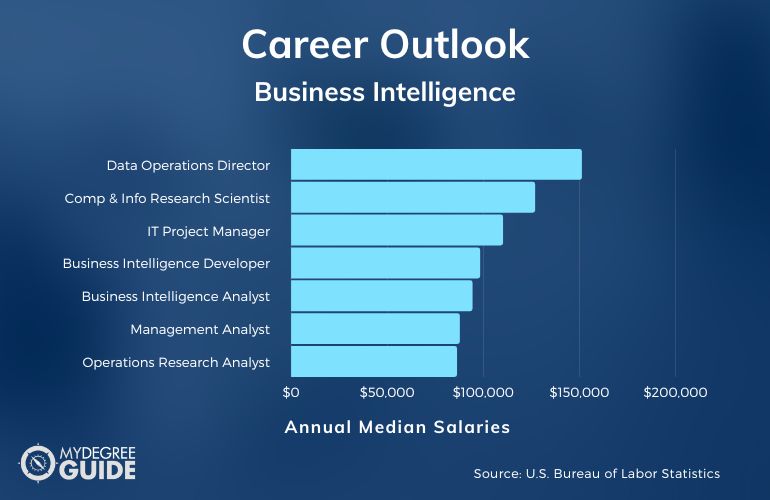If you’re good with both numbers and computers, you should consider getting an online business intelligence degree.

Editorial Listing ShortCode:
It’s a fast-growing field with a lot of job opportunities, and when you do your learning online, you can become fully qualified from the comfort of your own home.
Universities Offering Online Business Intelligence Bachelor’s Degree Program
Methodology: The following school list is in alphabetical order. To be included, a college or university must be regionally accredited and offer degree programs online or in a hybrid format.
1. American Military University
American Military University (AMU) is a member of the greater American Public University System (APUS). AMU was founded in 1991 to provide affordable, flexible learning options for military members. Bachelor’s, master’s, and doctoral degrees are available.
The school uses a unique model comprised of classes that start monthly to create enhanced flexibility. AMU offers fully online classes based out of the APUS headquarters in Charles Town, West Virginia.
- BS in Business Analytics
American Military University is regionally accredited by the Higher Learning Commission.
2. American Public University
American Public University (APU) offers more than 200 options for obtaining associate’s, bachelor’s, master’s, and doctoral degrees online. Founded in 1991, APU currently offers classes that begin monthly. The school offers a number of high-level degrees related to the security and intelligence fields.
This is an online school with a headquarters in Charles Town, West Virginia.
- BS in Business Analytics
APUS is accredited by the Higher Learning Commission.
3. Arizona State University
Arizona State University in Phoenix was founded in 1885. It has an enrollment number topping 90,000. Students can pursue bachelor’s, master’s, and doctoral programs across ASU’s 350 undergraduate majors and 100 graduate programs. ASU is comprised of 16 colleges and schools in total.
- BS in Business Data Analytics
Arizona State University is accredited by the Higher Learning Commission of the North Central Association of Colleges and Schools.
4. Bay Path University
Bay Path University of Longmeadow, Massachusetts, offers all-women bachelor’s and co-ed master’s programs. Students can complete all academic options online or on campus. Bachelor’s, master’s, and doctoral degrees are offered across a variety of disciplines. Total enrollment at Bay Path is just under 3,500.
The school has been ranked as one of the top women-led businesses in Massachusetts by the annual list compiled by the Boston Globe and the Commonwealth Institute.
- BS in Business – Business Analytics
Bay Path University is accredited by the New England Commission of Higher Education.
5. Bellevue University
Bellevue University is a private university located in Bellevue, Nebraska, that first opened in 1966. More than 10,000 students are enrolled today in Bellevue’s bachelor’s, master’s, and doctoral programs. Bellevue University’s bachelors degrees online have been ranked among the top in the country by U.S. News & World Report.
- BS in Business Analytics
Bellevue University is accredited by the Higher Learning Commission.
6. Capella University
Capella University was founded in 1993. Close to 39,000 enrolled students currently pursue bachelor’s, master’s, and doctoral degrees at this university based in Minneapolis, Minnesota. Undergraduates make up just 27 percent of Capella’s student population. Most Capella students study fully online.
- BS in Business – Business Intelligence
Capella University is accredited by the Higher Learning Commission.
7. Colorado State University
Based in Fort Collins, Colorado State University is a public research university that was founded in 1870. Colorado State’s 33,877 students can pursue 65 options for bachelor’s degrees, 55 options for master’s degrees, and more than 40 options for doctoral degrees. The school is comprised of eight colleges and 55 academic departments in total.
- BS in Management Information Systems and Business Analytics
Colorado State is accredited by The Higher Learning Commission.
8. DeVry University
DeVry University’s 17,364 students choose from hundreds of locations across multiple states when studying in associate’s, bachelor’s, and master’s degree programs. In addition, degrees can be completed fully online. DeVry is based out of Naperville, Illinois. It was founded in 1931. DeVry University’s academic offerings are divided into five colleges.
- Bachelor’s in Business Intelligence and Analytics Management
DeVry University is accredited by The Higher Learning Commission.
9. Drexel University
Founded in 1891, Philadelphia’s Drexel University currently enrolls 26,000 students across 70 undergraduate programs and more than 100 graduate programs. Bachelor’s, master’s, and doctoral degrees can be pursued across 19 schools of study. Drexel uses a cooperative education program that allows students to receive real-world work experience.
- BSBA in Business Analytics
Drexel University is regionally accredited by the Middle States Commission on Higher Education.
10. Embry-Riddle Aeronautical University
Embry–Riddle Aeronautical University is a private university that is the largest of its kind to focus on aviation and aerospace education. The school is split between main campuses in Daytona Beach, Florida, and Prescott, Arizona. ERAU was founded in 1926.
Current student enrollment throughout both of its main campuses, more than 130 international campuses, and online program stands at 31,100.
- BS in Business Analytics
Embry-Riddle Aeronautical University is accredited by the Southern Association of Colleges and Schools Commission on Colleges.
11. Florida International University
A member of the State University System of Florida, University Park’s Florida International University currently serves 58,787 students across a variety of bachelor’s, master’s, and doctoral programs. It is ranked among the R1 Doctoral Universities for having very high research activity. FIU is comprised of 11 colleges offering more than 190 programs of study.
- BBA in Business Analytics
Florida International University is accredited by the Southern Association of Colleges and Schools Commission on Colleges.
12. Golden Gate University
Founded in 1901, Golden Gate University is a university located in San Francisco, California. GGU offers six undergraduate degrees and 15 graduate degrees with dozens of concentrations across its bachelor’s, master’s, and doctoral programs. Enrollment across the five schools within GGU stands at 5,300.
- BS in Business – Data Analytics
Golden Gate University is accredited by the Western Association of Schools and Colleges.
13. Grand Canyon University
Grand Canyon University is a private Christian university located in Phoenix, Arizona. Founded in 1949, GCU currently offers more than 200 options for bachelor’s, master’s, and doctoral degree across nine colleges to its more than 100,000 enrolled students. The majority of GCU’s enrolled students pursue their degrees fully online.
- BS in Business Analytics
Grand Canyon University is accredited by the Higher Learning Commission.
14. Liberty University
Liberty University is an evangelical school located in Lynchburg, Virginia. LU’s enrollment of 100,000 makes it one of the largest private universities in the United States. Students can study for a variety of bachelor’s, master’s, and doctoral programs offered throughout LU’s 17 colleges. The school was founded in 1971.
- BBA in Data Analytics
Liberty University is accredited by the Southern Association of Colleges and Schools Commission on Colleges.
15. Oregon State University
Oregon State University is a public research university with a main campus in Corvallis, Oregon. The school has 31,719 students enrolled across more than 200 programs for undergraduate, graduate, and doctoral studies.
OSU is one of only four institutions in the country to be designated as a sea-grant school, space-grant school, and sun-grant school. OSU was founded in 1868.
- BS in Business Analytics
Oregon State University is regionally accredited by the Northwest Commission on Colleges and Universities.
16. Purdue University
Founded in 1869, Purdue University stands as a respected public research university with an enrollment number topping 43,411. The school’s flagship campus is located in West Lafayette, Indiana.
Purdue is designated among the nation’s R1 Doctoral Universities for its very high research activity. Students can pursue nearly 300 bachelor’s, master’s, and doctoral programs.
- BS in Analytics
Purdue University is accredited by The Higher Learning Commission.
17. Regent University
Regent University is a private Christian university located in Virginia Beach, Virginia. The university enrolls approximately 8,630 students throughout eight academic schools. Associate’s, bachelor’s, master’s, and doctoral degrees focused on more than 70 areas of study are available. Regent was founded in 1977.
- BS in Business Analytics
Regent University is accredited by the Southern Association of Colleges and Schools Commission on Colleges.
18. Saint Mary’s University of Minnesota
Saint Mary’s University of Minnesota is a Catholic university founded in 1912. While the school’s main campus is located in Winona, SMUMN also offers satellite campuses in multiple cities around the world. Total enrollment at SMUMN stands at around 5,900 students.
The university offers bachelor’s, master’s, and doctorate degrees both on campus and online. SMUMN is associated with the Institute of the Brothers of the Christian Schools.
- BSBA in Business Intelligence and Data Analytics
Saint Mary’s University of Minnesota is accredited by the Higher Learning Commission.
19. Southern New Hampshire University
Southern New Hampshire University is a private university with a main campus nestled between Manchester and Hooksett. SNHU uses a unique open-enrollment policy that only requires a high school degree or equivalent.
Established in 1932, SNHU currently enrolls more than 90,000 students across six schools of study. Bachelor’s, master’s, and doctoral degree programs are available.
- BS in Data Analytics
Southern New Hampshire University is accredited by the New England Commission of Higher Education.
20. Thomas Edison State University
Thomas Edison State University is a public university located in Trenton, New Jersey. Most of the university’s 10,000 enrolled students study fully online. Students are able to choose from associate’s, bachelor’s, master’s, and doctoral degrees covering more than 100 areas of study across five schools.
TESU is a recipient of the National University Technology Network (NUTN) Distance Education Innovation Award.
- BS in Data Science and Analytics
Thomas Edison State University is accredited by the Middle States Commission on Higher Education.
21. Villanova University
Villanova University is Pennsylvania’s oldest Catholic University. It also has the distinction of being the sole Augustinian university in the United States. Villanova was founded in 1842. It has been ranked as the 53rd Best National University in the nation by U.S. News & World Report.
It was also ranked in second place among U.S. News and World Report’s Best Value Schools. Villanova is the alma mater of Jill Biden, Joseph Clancy, Cardinal John Joseph O’Connor, and Howie Long. Students can pursue bachelor’s, master’s, and doctoral degrees covering the arts and sciences.
- Bachelor’s in Business Analytics
Villanova University is accredited by the Middle States Association Commission on Higher Education.
22. Washington State University
Washington State University in Pullman, Washington, dates back to 1890. More than 30,614 enrolled students pursue bachelor’s, master’s, and doctoral degrees at WSU annually. In addition to a physical campus, WSU runs a Global Campus for online learning. Bachelor’s, master’s, and doctoral degrees can be earned across 10 academic colleges.
- BS in Data Analytics
Washington State University is accredited by the Northwest Commission on Colleges and Universities.
23. Webster University
Established in 1915, Webster University is a private university based in Webster Groves, Missouri. The school’s more than 9,966 enrolled students can pursue bachelor’s, master’s, and doctoral degrees. Webster University has been ranked 15th among regional universities in the Midwest by U.S. News & World Report.
- BS in Data Analytics
Webster University is accredited by The Higher Learning Commission.
24. Western Governors University
Western Governors University is an online university based in Salt Lake City, Utah. Founded in 1997, WGU has a student enrollment that now tops 100,000. Students can pursue more than 55 options for bachelor’s and master’s degree programs across four colleges.
The Military Friendly Schools list ranks Western Governors University as the top school for veterans and members of the armed forces.
- BS in Data Management/Data Analytics
Western Governors University is accredited by the Northwest Commission on Colleges and Universities.
25. Wilmington University
Wilmington University is a private university founded in 1968. This school of more than 20,000 students has a main campus in New Castle, Delaware. More than 100 degree and certificate programs across seven schools are available for students pursuing bachelor’s, master’s, and doctoral studies.
- BS in Business Analytics
Wilmington University is accredited by the Middle States Commission on Higher Education.
What Is a Business Intelligence Degree?

Business intelligence (BI) turns raw data into actionable data. Whether it’s facts, figures, incomes, statistics, demographics or sales percentages, business intelligence is about analyzing the information and converting it into useful tools and technologies.
Many private companies employ BI professionals to help them improve their business’s bottom line. There are also firms and government agencies that hire BI professionals to work with data for the public good.
As a subject, business intelligence has similarities to things like business analytics and data analytics. Some people even use the terms interchangeably. However, most experts agree that they’re separate disciplines with separate functions:
- Business intelligence is about analyzing information. It looks backwards into a company’s history to interpret the data that came from various decisions and operational strategies.
- Data analytics looks at data as well, but it doesn’t stop there. It can also be used for things like predictive analytics which makes models and forecasts for the future.
- Business analytics combines both business intelligence and data analytics, and it’s sometimes used as an overarching term for everything related to a business and its data.
As you can see, all of these subjects are closely related, and there can be an overlap in everything from their coursework to their employment prospects. Don’t be surprised if you see the terms criss-crossing each other in degree programs, job descriptions and academic journals.
Courses for an Online Business Intelligence Degree

A business intelligence degree can teach you everything from basic business principles to advanced skills for developing software and troubleshooting computer networks.
A lot of your coursework will depend on whether you’re obtaining a “general” BI degree or if you’re specializing in something specific like cybersecurity, digital marketing, information systems or project management. Standard degree requirements usually look a bit like this:
Data Mining
Data mining is an essential skill for business intelligence professionals, and you’ll probably take multiple classes in it before you’re finished with your degree. It can teach you how to identify causes, effects, trends and statistical patterns in large chunks of data. This is how you’ll “mine” systems and networks to extract useful information for your employers.
Mathematics

You’ll need to be good with numbers to excel as a business intelligence expert. Algebra is a must; calculus may or may not be. Statistics is usually required.
Geometry is encouraged. In addition to outright math courses, you could also benefit from taking classes in math-adjacent subjects like logic, probability and number theory.
Information Systems
Information systems is a broad topic that can cover everything from databases to computer networks. You’ll need to learn about both software and hardware, and if you choose to specialize in something, you can become an expert in a particular aspect of information systems.
For example, if you’re skilled at troubleshooting, you could become an IT technician for information systems.
Programming

Programming is another broad and wide-ranging topic that can take you in many different directions depending on your interests. For example, you can learn programming languages like JavaScript, or you can learn how to build information systems from the very first line of code.
Programming courses aren’t a requirement for every business intelligence degree program, but they’re usually expected in specializations relating to software and web development.
Strategic Decision Making
This is a class for future business leaders. If you’re eyeballing careers that have “manager” in the title, you’ll need to know how to take the data that you interpret and transform it into actionable plans and strategies for your company.
Classes in strategic decision making can enable you to take charge of a situation and give yourself the best probabilities for success.
What Does a Business Intelligence Analyst Do?

According to the Bureau of Labor Statistics, the average salary for business intelligence professionals is $94,280 per year. It’s a lucrative industry, but what jobs does it actually offer?
Many people become business intelligence analysts. These professionals look at data from reports, networks and software systems to identify problem areas or figure out trends in sales and markets.
Depending on their exact job duties, they might compile the data to hand off to others, or they might take the data and form actionable business plans themselves.

Another common job for BI majors is business intelligence developer. These professionals work primarily with software, and they spend their time coding, programming and debugging the various networks and systems that businesses run on.
You can also find work outside of the “business intelligence” label. Every industry needs data specialists, so you can become an analyst for companies focused on finance, retail, marketing, accounting, healthcare, technology and more.
You can work within a company or act as a consultant. You can stay local or go international. You can join just about any field that you desire. Whether you’re considering a certification or advancing your education with a masters in business analytics online, masters in business intelligence online, or even an online PhD in business analytics, you’ll definitely have options when you go into business intelligence.
Business Intelligence Degree Salary

A career in business intelligence can really pay off. Here are a few common jobs and their salaries from the U.S. Bureau of Labor Statistics:
| Careers | Annual Median Salary |
| Data Operations Director | $151,150 |
| Computer and Information Research Scientist | $126,830 |
| Information Technology Project Manager | $110,140 |
| Business Intelligence Developer | $98,230 |
| Business Intelligence Analyst | $94,280 |
| Management Analyst | $87,660 |
| Operations Research Analyst | $86,200 |
| Financial Analyst | $83,660 |
| Business Consultant | $77,420 |
| Market Research Analyst | $65,810 |
An important thing to note is that these are median salaries. Your actual pay will depend on things like location, educational level, years of experience, industry demand and more.
For example, an entry-level business intelligence developer makes just $52,950 per year. With five years of experience, the average jumps to $71,790 per year. A senior developer with 20 years of experience can take home as much as $165,230 per year.
Median salaries are meant to balance out these figures. Rather than saying that a business intelligence developer can make between $52,000 – $165,000 per year, which is such a broad range that it’s almost useless, we say that a business intelligence developer makes around $98,230 per year.
Professional Organizations for Those with a Business Intelligence Degree

Professional organizations can offer a lot of resources to both students and post-grad employees. If you think that you could benefit from a community dedicated to business intelligence, here are just a few names to consider.
- Business Information Industry Association: Connecting more than 4,000 professionals all around the world, the BIIA offers one of the largest networks for business intelligence. It has many resources for members, including newsletters, conferences and a volunteer support network that’s available for advice and guidance.
- International Institute of Business Analysis: In addition to its academic resources, the IIBA offers several certification exams if you want to become something like a Certified Business Analysis Professional (CBAP). You’ll need to meet several prerequisites, but if you’re still working on them, you can utilize the educational materials of IIBA.
- Strategic and Competitive Intelligence Professionals: While not exclusively devoted to business intelligence, SCIP has thousands of articles and videos in its digital library that can help you with your studies. They also host an annual conference where you can meet like-minded professionals.
These are just a few of the biggest names in business intelligence. You can find plenty of other organizations dedicated to analytics, data management, business development and information technology, so don’t be afraid to do a little research of your own.
What Is the Best Business Intelligence Certification?

A bachelor’s degree is usually enough to qualify you for a job in business intelligence. However, some employers might ask for a master’s degree or professional certification.
There are a few different titles that you can pursue.
TDWI Certified Business Intelligence Professional
The Certified Business Intelligence Professional (CBIP) is offered by Transforming Data with Intelligence. It’s meant for senior-level business personnel with at least two years of experience and a four-year degree. You won’t be eligible as a student, but you can obtain your certification after you graduate.
DAMA Certified Data Management Professional
The Certified Data Management Professional (CDMP) is administered by the Data Management Association. It could be valuable if you’re interested in analytics, databases, administration or other jobs related to information systems.
NASBITE Certified Global Business Professional

Offered by the National Association of Small Business International Trade Educators, the Certified Global Business Professional (CGBP) will prove your knowledge and experience in international trade. It’s suitable for a wide variety of professionals who work in global business relations.
PMI Certified Associate in Project Management
You might be interested in becoming a Certified Associate in Project Management (CAPM) if you’re still a student. Offered by the Project Management Institute, it’s open to any high school graduate who has taken a certain number of hours in project management education. It’s an entry-level certification.
IIBA Business Analysis Certification
The International Institute of Business Analysis offers many different options for business intelligence certification, including the Entry Certificate in Business Analysis (ECBA) and the Certified Business Analysis Professional (CBAP). You’ll have to decide for yourself which title best suits your career goals.
Accreditation for Online Business Intelligence Degrees

Accreditation is a process that colleges go through to prove their educational standards. It’s voluntary, so some schools choose not to pursue accreditation, but it’s expected by most employers and is a critical part of qualifying for financial aid. You’ll want to choose an accredited school for your business intelligence degree.
The Council for Higher Education Accreditation (CHEA) is a good resource to look up colleges and their accreditation. Regionally, there are six accrediting boards in the United States:
- Western Association of Schools and Colleges
- Higher Learning Commission
- Northwest Association of Schools and Colleges
- Southern Association of Colleges and Schools
- New England Association of Schools and Colleges
- Middle States Commission on Higher Education
However, there are other accrediting boards out there, and you can research them through CHEA. Some boards are more reputable than others, so it’s worth doing your homework about this.
Financial Aid for a Business Intelligence Degree Online

If you can’t afford college on your own, financial aid can help. The first step is filling out the Free Application for Federal Student Aid (FAFSA). It doesn’t cost anything, and depending on your income level, you could qualify for several types of aid:
- Grants don’t have to be paid back, so they’re essentially free tuition money. The most common grant is the Pell Grant. It can be applied to almost any undergraduate degree program from an accredited school.
- Student loans have to be repaid, but if you qualify for a subsidized loan, the government will pay the interest while you’re in school. You can also apply for unsubsidized loans. They have higher interest rates, but their eligibility requirements are less strict.
- Work-study programs will connect you with part-jobs as a student. They’re usually campus jobs, however, so you might need to be physically close to your school even if you’re enrolled as an online student.
You can also look into scholarships for a little relief from college costs. You don’t have to be an all-star student to apply; there are scholarships for age, race, gender, major and degree type. There are even scholarships devoted solely to data science. As a business intelligence major, you’ll usually qualify for these.
Another option is getting financial aid through your employer. They might offer tuition reimbursement, or they might partner with a local college to give students discounts on job-related training or certification programs.
Is an Online Degree in Business Intelligence Worth It?

Yes, an online degree in business intelligence is worth it for many students. The Bureau of Labor Statistics is projecting 11% job growth in computer and information technology occupations over the next 10 years. Common careers in this field include business consultant, business intelligence developer, IT manager, and data operations director.
A business intelligence degree can be a wise investment for the future. The industry is booming, and the salaries for qualified professionals can climb quite high. If you’re interested in data, computers, numbers or analytics, this might be a nice career path for you.
